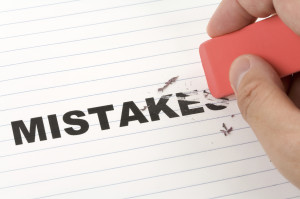



Because the competition on the job market is extremely high today job seekers have to make sure they submit perfect applications. Since most the majority of the candidates think the same way it is difficult to stand out as everyone tries to offer the best to the potential employer. A resume then becomes the key indicator of how well-prepared a candidate is. Therefore, job hunters have to pay special attention to how they write their CVs as it often becomes a decisive factor when you will be considered for an interview. Since a small mistake can cost you an interview we have started a series of blog posts related to the most common resume writing mistakes. We hope that it will help our readers to be more effective in their job search efforts.
Resume Writing Mistake: Irrelevant Information
 The wrong approach most job hunters take is they believe that the resume is created to demonstrate how good or even how professional they are. People like to develop lengthy CVs only to read them afterward and delight in what they have become on the paper. However, this is not what the hiring authorities expect from a resume. All they are interested in is whether you are able to fit in the context of their company and fulfill the needs of the organization.
The wrong approach most job hunters take is they believe that the resume is created to demonstrate how good or even how professional they are. People like to develop lengthy CVs only to read them afterward and delight in what they have become on the paper. However, this is not what the hiring authorities expect from a resume. All they are interested in is whether you are able to fit in the context of their company and fulfill the needs of the organization.
Everything that helps this idea should definitely be included in your resume; on the other hand, any piece of information that doesn't support the mission should be omitted. When writing their resume job seekers have to keep one simple thing in mind: they are to focus on what an employer would want to see on the document. If anything doesn't fit into this category don't hesitate to leave it out. You might wonder how in the world do I know what he/she wants to see on my resume? It is pretty easy: just check the company's website and pay special attention to who they are looking for. Read more about the culture of the company and job requirements.
These things will help you understand what you should concentrate on while writing your CV. Obviously, each and every job application is different so we can't really list all of the things you have to keep on your resume. But there are some principles which are generic and could be applied to any CV or resume. First of all, make sure you include only those experiences that are relevant to the job you are applying (there is no need to list all of your jobs). Secondly, eliminate superfluous words and back up your word with actual experience - this is far more persuading. Thirdly, don't include the references unless requested (the sentence at the end of a resume that you will provide the references upon the request makes no sense because it is obvious to every employer that you will do so.) Lastly, remove the objective statement if it brings no useful information to a potential employer.







